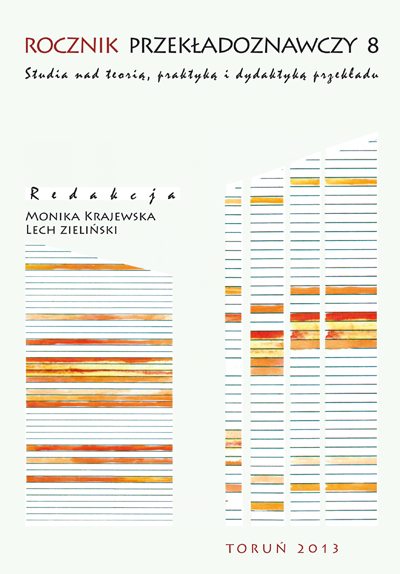„Pyszne” tłumaczenie, czyli jak uczyć przekładu przepisów kulinarnych z języka angielskiego na język polski
DOI:
https://doi.org/10.12775/RP.2013.012Słowa kluczowe
dydaktyka przekładu, kompetencja tłumaczeniowaAbstrakt
Głównym celem niniejszego artykułu jest ukazanie problemów tłumaczeniowych związanych z przekładem przepisów kulinarnych oraz odpowiedniej metodologii wykorzystywanej w nauczaniu tego tematu. Analiza poszczególnych trudności tłumaczeniowych pozwala dostrzec te aspekty, na które należy zwrócić szczególną uwagę podczas zajęć z translatoryki, sugestia zaś planu zajęć z przekładu przepisów kulinarnych z naciskiem na podejście zorientowane na proces umożliwia krytyczną refleksję nad współcześnie wykorzystywanymi technikami nauczania sztuki przekładu oraz przydatnością proponowanej niżej metody w kontekście potrzeb przyszłych tłumaczy.Bibliografia
Belczyk, A., 2007, Poradnik tłumacza, Kraków.
Fox, O., 2000, „The Use of Translation Diaries in a Process-Oriented Translation Teaching Methodology”, [w:] Developing translation competence, Ch. Schäffner, B. Adab (red.), Amsterdam‒Philadelphia, s. 115‒130.
Gile, D., 2009, Basic Concepts and Models for Interpreter and Translator Training, Amsterdam‒Philadelphia.
Hervey, S., Higgins, I., Haywood, L., 1995, Thinking Spanish Translation: A Course in Translation Method: Spanish to English, Abingdon‒New York.
Kozłowska, Z., 2001, „O błędach językowych w tekstach polskich przekładów”, [w:] Język rodzimy a język obcy. Komunikacja, przekład dydaktyka, A. Kopczyński, U. Zaliwska-Okrutna (red.), Warszawa, s. 137‒147.
Mocarz, M., 2007, „O poprawności przekładu tekstów użytkowych”, [w:] Współczesne kierunki analiz przekładowych, M. Piotrowska (red.), Kraków, s. 133‒141.
Piotrowska, M., 2011, Learning Translation Learning the Impossible? A Course of translation from English into Polish, Kraków.
Preložniková, S., Toft, C., 2004, „The role of translation studies within the framework of linguistic and literary studies”, [w:] Translation in Undergraduate Degree Programmes, K. Malmkjær (red.), Amsterdam‒Philadelphia, s. 83‒96.
Pobrania
Opublikowane
Numer
Dział
Statystyki
Liczba wyświetleń i pobrań: 2139
Liczba cytowań: 0



